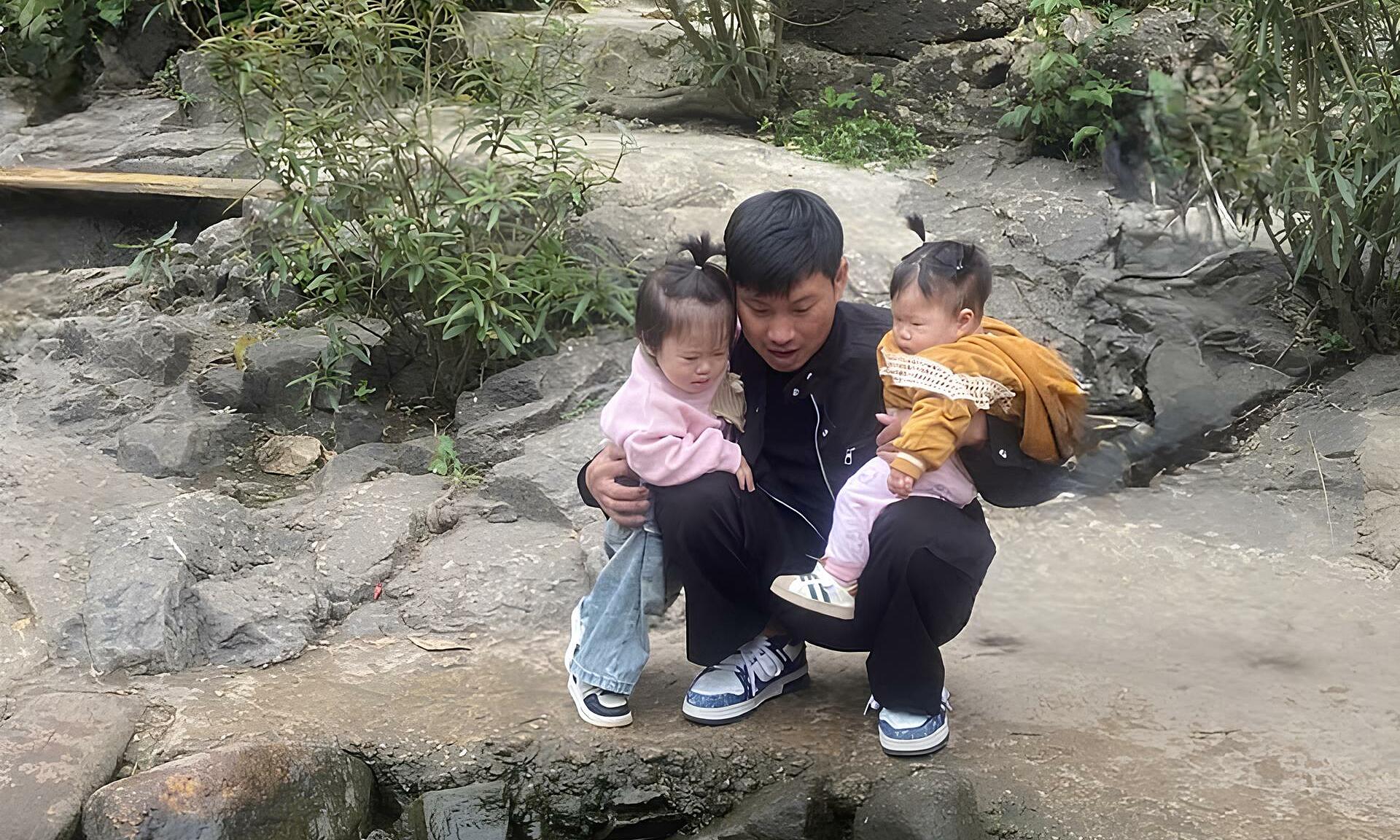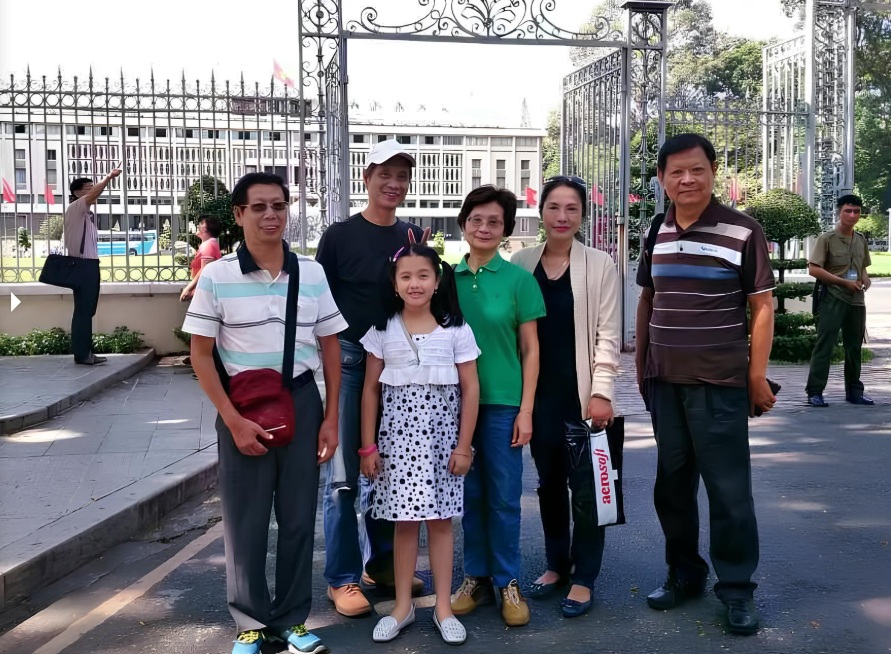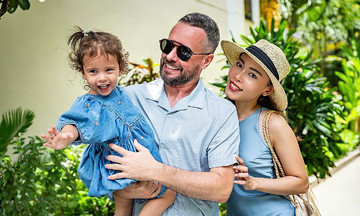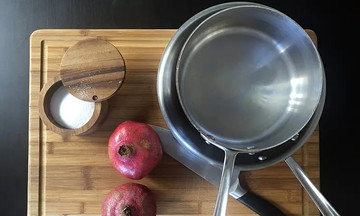Duyen, 23, from Hanoi, recounted that two years ago, while pregnant with her second daughter, she suggested to her husband that the child take her surname. Her first child had taken her husband's surname, Ho, and she reasoned that since children are the crystallization of a couple's love, their second child should take her surname, Tran.
"I want my children to see that their parents are equal, no one is superior to the other in the family," she explained.
Her husband, Ho Tuan, initially worried about potential procedural difficulties and societal scrutiny, despite finding his wife's proposal reasonable. After consulting with a judicial officer and learning that the law supported this practice, he agreed.
Both families also supported their decision. "My mother-in-law said it didn't matter whether the children took their father's or mother's surname, as long as they were raised well," Duyen shared.
 |
Tuan with his two daughters during Tet, 2025. Photo: Tran Duyen |
Tuan with his two daughters during Tet, 2025. Photo: Tran Duyen
On 14/9, she shared her family's story on social media, immediately sparking a heated debate. While a few supported Duyen and her husband's decision, the majority criticized them for acting thoughtlessly and "harming their children's future."
"Later, when the children go to school, people will think their biological father is their stepfather because of the different surnames," and "Those who go against tradition will never have a fulfilling life," were among the most popular comments.
Hoang Thu Huong, 36, from Nam Dinh, expressed surprise at the couple's decision. She said she would not register her child under her surname, even if her husband agreed. "Strangers seeing two children with different surnames will assume they don't share the same father or that I've been married twice," she said. "Not to mention relatives might not consider me part of the family lineage, and the children themselves might experience conflict due to the difference."
Duyen explained that she shared her family's story simply to spread happiness, not expecting such criticism. "I hope people respect our family's decision," she stated.
The mother believes that as long as the couple provides equal love to both children and maintains a happy family, everything will be fine. "Later, I will explain to my children that because their parents live in a civilized and equal society where love and respect prevail, they were registered this way," she said. As for relatives, she will remind them to be respectful and avoid hurting the children.
 |
A baby born at Tu Du Hospital, 3/2024. Photo: Thi Quan |
A baby born at Tu Du Hospital, 3/2024. Photo: Thi Quan
Lawyer Hoang Trong Giap, from Hoang Sa Law Firm in Hanoi, explained that Article 26 of the 2015 Civil Code allows parents to agree on whether their child takes the father's or mother's surname. In cases of multiple children, one can take the father's surname and another the mother's. "Fundamental legal matters such as care, upbringing, and inheritance will not be affected by a child having their mother's surname," he confirmed.
Cultural expert Pham Ngoc Trung, former head of the Development Cultural Studies Department at the Academy of Journalism and Communication, believes those debating and criticizing Duyen's family's decision lack understanding of both family history and legal regulations. Many are still influenced by traditional views, as in feudal society, all children had to take their father's surname.
According to Professor Hoang Ba Thinh, senior lecturer at the Faculty of Sociology and Social Work, Vietnam National University, Hanoi, giving children their mother's surname or combining both parents' surnames is not a new phenomenon. It has occurred sporadically in various places for the past 30-40 years.
This phenomenon has also emerged in traditionally patriarchal countries like China and Japan. A report by the Chinese Ministry of Public Security revealed that in 2020, approximately 7.7% of newborns carried their mother's surname. In Japan, where marriage law requires couples to share the same surname, over 95% of families follow the father's surname. However, a growing number of women are advocating for reforms to retain their original surnames and have the right to give their children their mother's surname.
"Beyond gender equality, this demonstrates the modern thinking of young couples who love, cherish, and respect each other," Professor Thinh commented.
Cultural expert Pham Ngoc Trung added that whether a child carries their father's or mother's surname is not a determining factor in their future. This is evident in certain matriarchal communities in the Central Highlands, Quang Ngai, Quang Nam, and along the Truong Son mountain range.
Nay Djrueng, the only child of Kbor Djoang and Nay H'Che, from Ia Dreh, Gia Lai, was given his mother's surname. He stated that he has never encountered any issues or questions from friends or others. "As adults, we are independent individuals. What matters is how you live, not whether you carry your mother's or father's surname," he affirmed.
Dong Lam Nha Tran, 18, from Ho Chi Minh City, shared that her father's surname is Lam and her mother's is Dong. Her two older sisters have the surname Lam, while she was registered with her mother's surname, Dong. "My father loves my mother very much, so when I was conceived, he decided that our youngest child should take her mother's surname," she recounted.
Her sisters and paternal family have always loved her, and there has never been any differentiation. Her friends also haven't questioned it because whenever her father picked her up, "they could see the striking resemblance."
 |
Nha Tran at age 11 (in the floral dress) with her parents and paternal family visiting the Independence Palace. Photo provided by the subject. |
Nha Tran at age 11 (in the floral dress) with her parents and paternal family visiting the Independence Palace. Photo provided by the subject.
From a psychological perspective, child expert Le Khanh (Ho Chi Minh City) advises parents to agree on one surname for all their children to avoid questions about differences within the family and the pressure of explaining it to outsiders. "Psychologically, I believe children are not affected as long as they are loved and receive reasonable explanations," he stated.
Professor Thinh believes there is no need for concern. As children grow older, parents can explain the reasons. "The child might even feel proud of their parents' understanding and sharing," he said.
Dong Lam Nha Tran agrees. She shared that when she learned her name stemmed from her father's love and respect for her mother, she felt very happy. "My boyfriend said if we get married, he'd also like our children to carry my surname because it's beautiful and unique," Nha Tran said.
Duyen and her husband emphasized that they only shared their story and are not encouraging others to follow suit. "Every family has its own perspective. We believe that as long as we love and raise our children well, our family will be happy," she concluded.
Pham Nga












